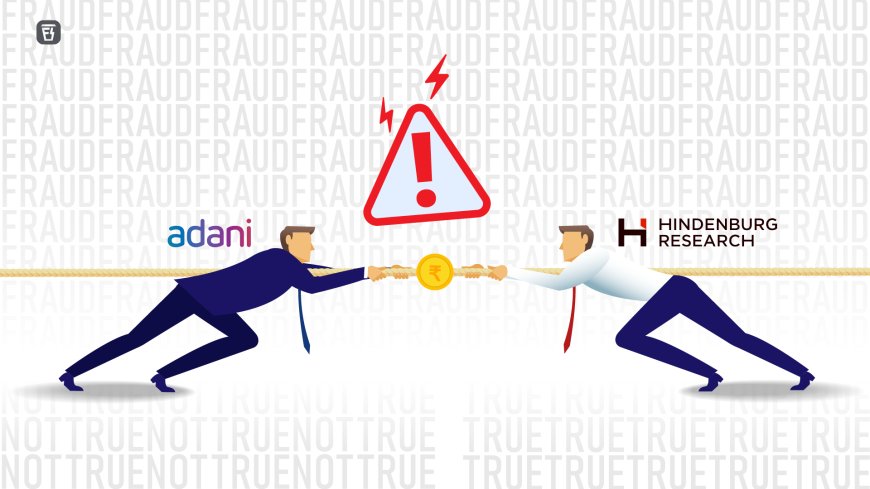Adani Vs Hindenburg Research : What you need to know
The article discusses allegations against Gautam Adani by Hindenburg Research for financial misconduct. These accusations led to PILs being filed in the Supreme Court, requesting investigations into Adani's practices and Hindenburg's short positions. A committee found no regulatory violations by SEBI. The Supreme Court ordered SEBI to conclude its investigation into Adani within three months and assess if Hindenburg's actions harmed Indian investors.

-
ADANI AND HINDENBURG: WHO ARE THEY?
Gautam Adani began his career as a commodities trader before constructing his enterprise. The relationship between the state where India's Prime Minister Narendra Modi hails from and his opponents has long been a source of controversy. Adani, a school dropout who grew to become Asia's richest person before Hindenburg's report, has ventured into the media, cement, ports, power generation, airports, mining, and renewable energy. Nathan Anderson started Hindenburg Research in 2017. This company does forensic financial research and evaluates derivatives, credit, and equity. It has a history of identifying corporate malfeasance and betting against the firms.
-
WHAT MENTIONED HINDENBURG ABOUT ADANI?
Last year, Hindenburg revealed that it has short holdings in Adani firms through non-Indian-traded swaps and U.S.-traded bonds. It published a paper alleging that Adani had misused tax havens and raised questions about the company's high debt levels. Hindenburg released a study in January of last year claiming that the Adani Group had engaged in misconduct. Cooking books of accounts, inflating import expenses excessively, and roundtripping personal funds to boost share prices were among the accusations. This year, the Supreme Court granted Adani Group relief, ruling that it does not require further inquiry. Adani Group refuted all of the charges. Gautam Adani, who was ranked as the second richest person in the world at the beginning of 2023, fell out of the top 20 as a result of the news, which sparked a selloff in the conglomerate's equities worth over $150 billion. Following that, the Supreme Court received several public interest lawsuits (PILs) requesting an investigation into the Hindenburg claims and their effects on the Indian stock market.
-
What were these PILs about?
Before the Supreme Court, four PILs were submitted. Concerns were expressed in the first about the sharp decline in the securities market, the effect on investors, the alleged absence of recourse, and the issuance of loans to the Adani Group without following the proper processes. It requested the formation of a commission to look into the Hindenburg report, overseen by a former Supreme Court judge. According to the second PIL, the group "surreptitiously controlled more than 75% of the shares of its listed companies, thereby manipulating the prices of its shares in the market," in violation of India's public holding regulations. It requested that the CBI or a SIT conduct a probe into the case under judicial supervision. The third PIL requested a probe of the financial transactions of the Adani Group, specifically the part played by the State Bank of India (SBI) and Life Insurance Corp (LIC) in these transactions, under the supervision of a sitting judge of the Supreme Court. In the meantime, the fourth PIL sought the registration of a first information report (FIR) against Nathan Anderson, the founder of Hindenburg, for taking short positions in the company using foreign-traded derivative instruments and US-traded bonds, and for recovering the profits from those transactions to reimburse Indian investors.
It noted that the Securities and Exchange Board of India (SEBI) is already investigating the claims made against the Adani Group and instructed Sebi to carry out its investigation into potential breaches of minimum public holding regulations, omissions of related party transactions, and stock price manipulation. In addition, a six-member committee led by retired Supreme Court judge AM Sapre was established to look into any regulatory shortcomings in handling claims of Adani Group-related securities market legislation violations. The group was also asked by the court to recommend ways to improve investor awareness and protection.
-
What did the six-member committee say?
The tribunal concluded that SEBI had not handled the issue in a way that violated any regulations. SEBI, however, has long harbored suspicions that some of the public shareholders in Adani firms are fronts for the promoters rather than being genuinely public shareholders. Additionally, it stated that because foreign jurisdictions were non-cooperative, Sebi's investigation into foreign institutional ownership in these businesses had come to a standstill. Furthermore, no discernible pattern of abusive trading in Adani stocks was discovered. In response to Hindenburg's accusations, SEBI began looking into the conglomerate; the Supreme Court was in charge of the investigation. In response to lawsuits filed by plaintiffs representing the public interest, the court ruled on Wednesday that the case's circumstances did not support the market regulator's decision to transfer the inquiry to another agency. The regulator was also ordered by the highest court to wrap up its inquiry into the business in three months.
They said that since SEBI has no authority over Hindenburg, it can't take action against it. United States law governs Hindenburg. Additionally, they claimed that the Hindenburg study did not address securities in India, and therefore, by SEBI regulations, it is not a "research report". Furthermore, as required by SEBI laws, Hindenburg has not released the report to assist investors in making choices about the securities traded in India. Furthermore, obtaining a registration certificate from Sebi is not required by law.
In the Current Situation, Twenty-two of SEBI's twenty-four investigations were completed. Out of the twenty-four, thirteen concerned related party transactions, five insider trading, two stock price manipulation, and one each on trading before and following the Hindenburg report, public holding standards, FPI laws, and takeover code violations. SEBI was instructed by the Supreme Court to wrap up the two ongoing investigations in three months. Following the investigation's conclusion, Sebi may file a lawsuit against the organizations it determined to violate the law. The top court has directed Sebi to investigate if Hindenburg's short positions caused Indian investors to lose money, and if so, what steps should be taken to make amends within three months.











































